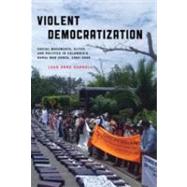
Note: Supplemental materials are not guaranteed with Rental or Used book purchases.
Purchase Benefits
What is included with this book?
| List of Illustrations | p. ix |
| List of Abbreviations | p. xi |
| Acknowledgments | p. xiii |
| Introduction | p. 1 |
| Urabá in the Reform Period: Social Movement Gains with High Violence | p. 53 |
| The Counterreform Period in Urabá: Decimation of the Left, Right-Wing Unionism, and Transnational Human Rights Alliances | p. 106 |
| The Caguán in the Reform Period: Negotiated Peace and Social Movement Gains, Followed by Defeat of the Left | p. 121 |
| The Counterreform Period in the Caguán: FARC Belligerence, Renewed Military Attacks, and a Revived Settlers' Movement | p. 158 |
| Arauca in the Reform Period: Pacted Peace and Social Movement Gains | p. 177 |
| Arauca in the Counterreform Period: Human Rights Movements versus Selective Recentralization | p. 228 |
| Conclusion | p. 274 |
| Notes | p. 326 |
| Bibliography | p. 385 |
| Index | p. 427 |
| Table of Contents provided by Ingram. All Rights Reserved. |
The New copy of this book will include any supplemental materials advertised. Please check the title of the book to determine if it should include any access cards, study guides, lab manuals, CDs, etc.
The Used, Rental and eBook copies of this book are not guaranteed to include any supplemental materials. Typically, only the book itself is included. This is true even if the title states it includes any access cards, study guides, lab manuals, CDs, etc.